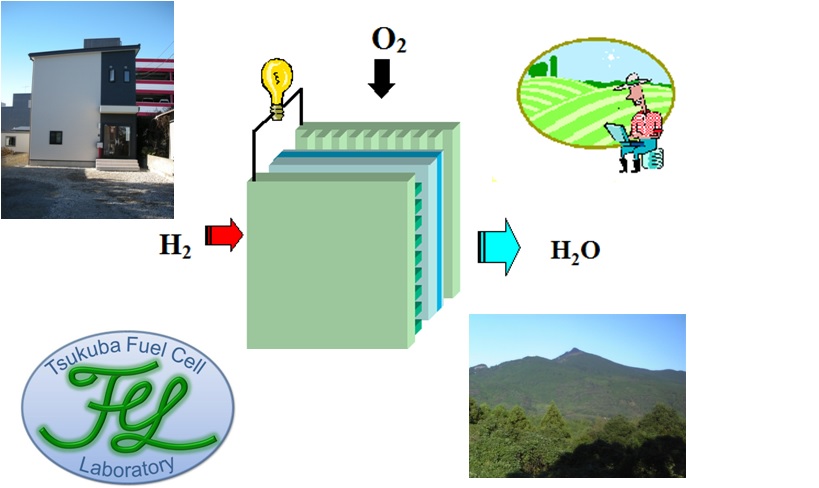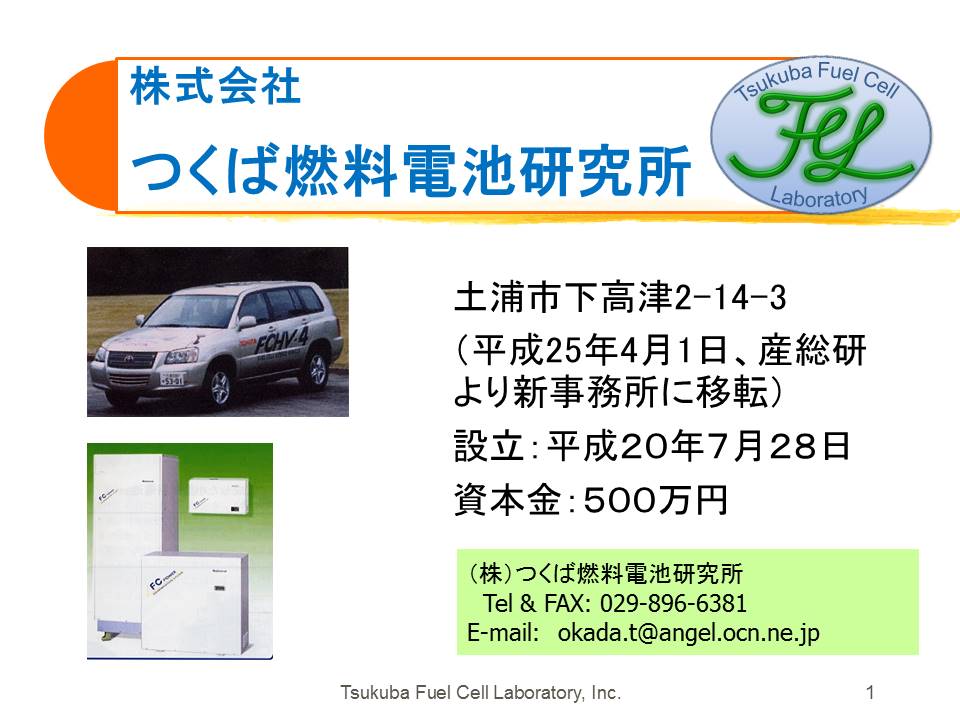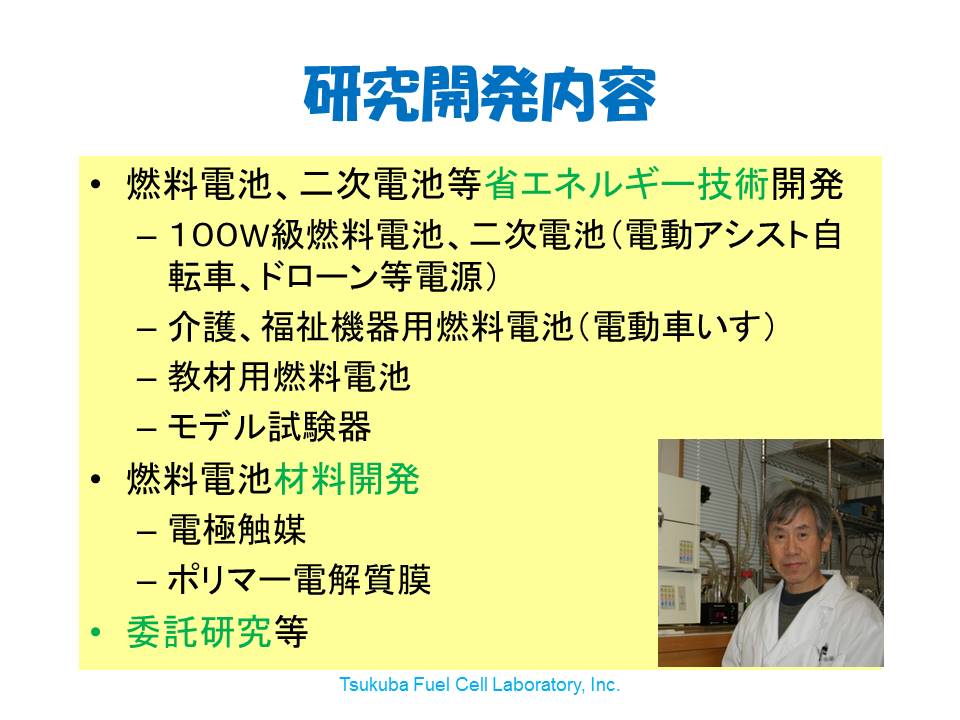
当社は燃料電池産業とともに歩む技術力を持った新興中軸会社として、燃料電池技術や二酸化炭素削減技術など、クリーンエネルギー社会を目指した技術の発展・向上に寄与し、地球温暖化対策への貢献を目指します。
Company's policy
Tsukuba Fuel Cell Laboratory, Inc. (TFCL), as a new emerging and developing
company with the expertise in fuel cell technology, aims at supporting
the development of fuel cell technology and advancement of related industries,
for the solution of global warming issues.
会社方針
背景と概要
ここ数年に起きている豪雨、水害などの自然災害は、これまでの常識を越えた深刻な被害をもたらしており、「気候変動」問題はマスコミでも大きく取り上げられるようになってきました。影響は我が国だけでなく、世界の至る所の国や地域において猛暑、干ばつ、大規模水害などの大被害が報告されている。まさに異常気象とも言える状況が現実のものとなっており、事態は深刻となっています。
気候変動の問題は、地球温暖化問題として近年大きく取り上げられるようになってきました。気象庁データによると、「世界の年平均気温は、長期的には100年あたり0.73℃の割合で上昇し、特に1990年代半ば以降、高温となる年が多くなっています」と報告され、この推移は地球温暖化ガス(二酸化炭素、メタン、フロンなど)の大気中増加と関連付けられています。このような背景の中、2022年にエジプトで開催されたCOP27においても「地球温暖化物質」である二酸化炭素放出国の責任が問われています。2017年のパリ協定で謳われた「2050年までにカーボンニュートラル社会」の実現は、待ったなしの課題となっています。
そのための解決策として、化石燃料からの脱却、再生可能エネルギーへの移行が強く求められますが、何よりも重要なのは「クリーンな水素エネルギー社会」の実現であり、水素を介したエネルギー貯蔵、運搬、変換サイクル、及びインフラの確立です。
弊社の事業プランにおいては、2つの課題に注目します。
1.1つは、究極のクリーンで高効率な発電機である燃料電池の普及であり、燃料電池自動車、家庭用エネファームなど広く普及が期待されています。商業化に伴う課題としてコスト削減に向けた研究開発の推進があり、現在でも新規材料開発の基礎研究が続けられています。
2.他の1つは、産業革命以来増加し続けている二酸化炭素濃度の抑制と固定化、特に有用物質への転換など技術的課題の解決です。二酸化炭素の海底や地中固定化などの技術開発に加えて、炭素を含む有用物質、例えばメタノールやエチレンなど化学産業における原料物質に変換し、最終的に製品化できることが望ましい方向と思われます。
上の2つの課題に共通するのは、「電気を用いたガス反応の制御」です。
1.即ち、燃料電池とは水素ガスと空気中の酸素ガスの反応に伴う化学エネルギーを、直接電気エネルギーに変換し発電装置であり、ガスと電気との変換過程の効率化を目指します。
2.二酸化炭素の電解還元による有機物質への変換においても、ガスと電気との変換過程の制御と効率化が課題であり、何よりも有用な物質の生成自体が難しいチャレンジとなっています。
「電気を用いたガス反応の制御」は、学問的には電気化学分野の課題となります。国内的には電気化学会、海外では米国のThe Electrochemical
Societyや欧州のInternational Society of Electrochemistryなどがあり、この課題に取り組む研究者は多く重要性も認識されている。
キーテクノロジーとなるのはガス電極と呼ばれるガス、電子伝導体、イオン伝導体からなる「3相界面」の構造と反応促進物質(触媒)の設計及び開発です。特に低コスト高効率触媒の開発は最重要課題となります。
そのためには「電気を用いたガス反応」モデル系による小型試験装置を用いて、新触媒、新材料の開発に注力する必要があります。弊社では「研究者一人1台の安価で多機能な小型計測装置」をコンセプトに、クリーンエネルギー社会を目指す研究者を支援するための製品開発を行っており、そのための高機能試験装置を設計・開発する技術とノウハウを有しています。
即ち、「電気化学計測」を大幅に活用した弊社独自の評価機器とモデル試験機の開発を通して、研究者が電気化学的手法によるガス反応系の研究支援技術を提供します。
最終的に、水素ガス反応、酸素ガス反応、二酸化炭素ガス反応の電気化学制御を通して、水素クリーンエネンルギー社会、カーボンニュートラル社会を目指した、持続可能な社会の実現に貢献します。
代表からのご挨拶
弊社は燃料電池に関する新規の材料開発、及び関連する評価技術の向上を目指して、2008年に産総研ベンチャーとして設立されました。燃料電池は環境に優しいエネルギー源として、近年注目され相次いで市場化が進んでおり、次世代技術として今後発展が見込まれる産業分野となることが期待されています。
燃料電池の原理が見いだされたのは19世紀前半ですが、技術的な課題が多くあり、実際に実用化に向けた取り組みが行われたのはアメリカの宇宙開発以降のことになります。1990年ころから民生用の燃料電池開発が本格化し、先人たちによる20年以上の研究開発の努力が今日実を結ぼうとしています。
エネファーム(家庭用燃料電池)や燃料電池自動車が本格化しようとする現在、これ以上研究することがあるのかと思われる方もいるかも知れません。しかし、燃料電池技術の課題はまだ根本的には解決されていないのが現状です。その1つが高価な材料を代替し、一般消費者が魅力を感じるコストを実現する課題であります。その努力は1960年代から始まり、50年以上の時を経過し今日に続いています。
燃料電池は規模の大きさに依らず高い発電効率が見込まれるため、自動車などの100kW級から携帯機器用の10W級まで、幅広い分野で今後使用される可能性を秘めています。新しい応用分野開拓も魅力的な課題です。
一方、近年世界中で問題となっている気候変動、地球温暖化、大規模自然災害に対しては世界的に危機感が共有されており、世論及びマスコミからも一日も早い解決の道筋が求められています。二酸化炭素など地球温暖化物質の削減など、カーボンニュートラル社会に向けた研究を支援するための技術開発及び支援技術開発は、先送りできない逼迫した課題であります。一見地味であっても、将来への期待及び成長性が見込まれる分野であり、またそうしなければ世界中が大きなリスクに直面することになり、必ず必要とされる分野であると思われます。
いずれも難しい課題であるからこそ、弊社はこれら課題の解決に取り組み、産業の発展に寄与できることを使命と考えます。燃料電池技術開発、化石燃料からの脱却に関する基礎、応用、開発研究のお手伝いができるような新規材料開発、及び材料評価技術の提案を目指し、歩み続けます。


お知らせとお願い:
最近のコロナ禍状況、及びそれに伴うサプライチェーンへの影響など、ものづくりの環境にも大きな影響が出ています。原材料不足や価格の変化に伴う納期遅れや製品価格など、弊社のみの努力では解決できない問題も出始めており、製品のご提供の上で行き届かないことも生じてくるかも知れません。
特に製品価格については、「研究費不足で悩む研究者に少しでもご協力したい」との弊社の方針に基づいて設定しておりますが、状況により変化せざるを得ないことも予想されます。現在ホームページで価格目安は提示しておりますが、見積り依頼をいただいてからの納期及び正式な価格のご提示となります。何卒ご理解いただきますよう、お願いいたします。
English
TSUKUBA FUEL CELL LABORATORY, INC. (TFCL)
ADDRESS: Shimotakatsu 2-14-3, Tsuchiura, Ibaraki 300-0812, JAPAN
ESTABLISHED: 28 July 2008
CAPITAL: 5 million yen
1. Outline of the Company:
TFCL was established in 2008 under the "Venture Business Laboratory"
program of AIST, with the basis of low temperature fuel cell technology,
which was nurtured by "New Sunshine Program" of Agency of Industrial
Science and Technology, former Ministry of International Trade and Industry
and present AIST.
During the past more than ten years, AIST accumulated a reserach potential
in the field of (1) Fuel cell investigation technology, (2) new materials
on electro-catalysts and polymer electrolyte membrane and (3) system technology,
and disseminated them as research papers, books and patents to the world.
AIST also contributed in persuing cooperations among universities and industries.
From those experiences TFCL continues to contribute as a partner to the
fuel cell industries and local communities, promote R&D based on AIST
reserach potentials.
TFCL has moved its office to Tsuchiura on April 1, 2013, after 4 and a
half years of venture activities in AIST Tsukuba center cite. Located near
the traditional business area in Tsuchiura, TFCL will contribute as a new
member of the local business district, to the development of Tsuchiura
city.
TFCL will contribute to the development of fuel cell industry and promotion
of related technologies and solution of global warming issues through the
following activities:
1. New materials (electro-catalysts and polymer electrolyte membranes,
etc.) related to fuel cell components and their marketing
2. Development and sales of measuring and evaluaiton technologies related
to fuel cells
3. Development and sales of peripheral technologies (sensor, etc.)
4. Development and sales of small scale direct liquid fuel cells for portable
applications
5. Other related activities.
Visions of the company: TFCL aims a new emerging and developing company
working with fuel cell industries.
2. Background ability for research and development in TFCL
TECHNOLOGY: Low cost and reliable measuring apparatus utilizing "electrochemical
techniques"
TARGET: Versatile equipments catching conditions of fuel cells
FEATURE: Testing apparatus incorporating the gas reaction models
PRODUCTS: Testing equipments for product lines, Measuring apparatus for
R&D, Instruments for model developments
3. Sales for products
Testing apparatus for membrane electrode assemblies (MEA) - major components
of fuel cells
Measuring methods and instruments for materials development
Especially, standard testing apparatus for R&D
Fuel cells - important technology
Polymer electrolyte fuel cells (PEFCs) and direct liquid fuel cells (DLFCs)
are now an important technology, ranging from basic materials research
to applications such as system developments. Fuel cells are expected to
be a key technology to solve the issue of energy and environments that
are becoming a serious problem in this century. The principle of fuel cells
had already been found about 160 years ago, but recent technological efforts
had to be done before this is commercially established. There are however,
still many challenges to overcome in order to meet the requirements for
fuel cells such as efficiency, cost and longevity, etc, and innovation
of material technology is desired.
Presently, about 70% of the energy consumed by humans is supplied from
fossil energy. Burning carbon brought about the negative heritage of global
warming problems today. We have to reduce the C content from the total
fuel progressively, and utilize natural energy with high efficiency (conversion,
storage and transmission). Hydrogen economy should be such an option, and
the shift from large-scale central power generation to local distributed
power source would be the future trend.
Fuel cells are regarded as the "Ace of high energy utilization society".
Fuel cells are the energy generator that converts chemical energy directly
into electrical energy without burning process, and theoretically attain
more than 80% of energy conversion efficiency. Comparing with internal
combustion engines like gasoline or turbine engines that make only 35%
efficiency, fuel cells are highly efficient energy converters, and moreover,
clean facilities since they do not emit exhaust gas, particles or noise.
Before TFCL was established, the laboratory had been involved in the polymer
electrolyte fuel cell project of "New Sunshine Program" of the
Agency of Industrial Science and Technology in the former Ministry of International
Trade and Industry from the incubation stage, and has 10 year potential
in the research activity. Our efforts in PEFC have been engaged in polymer
electrolyte, impurity and degradation problems, catalysts etc., and now
cover not only basic research but also application technologies.
We understand that the aim of TFCL is to establish technologies based on
original seeds, and very much appreciate help and suggestions from the
outside.
Words form the Director
Tsukuba Fuel Cell Laboratory, Inc. was founded in2008 as a venture company
in the National Institute of Advanced Industrial Science and Technology
(AIST), which aims to produce new materials and related evaluation methods
in fuel cell technology. Fuel cells are recognized in recent years as the
environment benign electricity generator, and are being marketed in various
fields: They are expected as the next generation technology for growing
industries.
The principle of fuel cells was discovered in the early 19th century, but
due to the difficulty in technical problems, major practical achievements
were done after the space age in USA. Commercial application of fuel cells
was stimulated from around 1990, and 20 years of efforts by precedent pioneers
are bearing fruit now.
People may think: "In this time the Ene-farm (stationery fuel cells)
and FCV (fuel cell vehicles) are realized commercially, is it necessary
to do researches on fuel cell technology?" The fact is that, the major
problems of the fuel cell technology are actually not resolved yet. One
of them is very high cost of elements of fuel cells, which prevents consumers
from accepting as attracting products. The efforts to resolve these problems
are continuing for more than 50 years.
A good feature of fuel cell generator is a high energy efficiency that
does not depend on its size. It has a potential to be used from high (100kW
type in FCV) to low (some 10W system for mobile equipments) levels of electricity
generators. To find new horizons for fuel cell applications is also an
attractive subject.
These problems are all challenging, but Tsukuba Fuel Cell Laboratory considers
it as its vocation, to pursue these challenges, and to contribute to the
development of fuel cell industry. We support basic and applied researches,
as well as commercial stage of the product researches, by developing new
materials and related material evaluation methods. Your cooperation will
be appreciated. Let's get going now!
Tsukuba Central Park